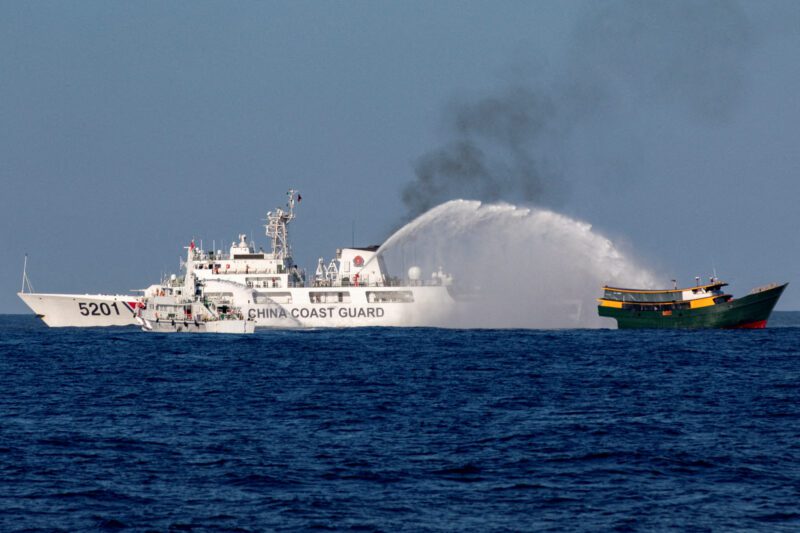Hung Cao – A Navy Diver In The Pentagon Briefing Room
Hung Cao and the Fight to Rebuild America’s Maritime Power Before the Next War Arrives by Captain John Konrad (gCaptain) The first thing you notice about the US Navy’s Undersecretary...

By David Brunnstrom (Reuters) – The Philippines is determined to assert its sovereign rights in the South China Sea, its foreign secretary said on Friday at a meeting with U.S. allies to show support for Manila over an increasingly fraught standoff with China in the strategic waterway.
Speaking at the U.S. State Department, Enrique Manalo accused China of “escalation of its harassment” of the Philippines, while U.S. Defense Secretary Lloyd Austin said Washington stood with Manila against what he described as “coercion.”
Recent maritime run-ins between China and the Philippines, a U.S. treaty ally, have made the highly strategic South China Sea a potential flashpoint between Washington and Beijing.
The officials spoke at a meeting between U.S. and Philippines defense and foreign secretaries and their national security advisers, a day after leaders of the U.S., Japan and the Philippines met at the White House to push back against Beijing’s increased pressure on Manila.
“We are determined to assert our sovereign rights, especially within our economic – exclusive economic zone,” Manalo said.

He said he hoped Friday’s meeting would allow Washington and the Philippines to better coordinate their responses on the diplomatic and defense and security fronts.
Austin said the U.S. commitment to its mutual defense treaty with the Philippines was “ironclad”.
“We’re working in lockstep … to strengthen interoperability between our forces, to expand our operational coordination and to stand up to coercion in the South China Sea,” he said.
Two prominent U.S. senators this week introduced a bipartisan bill to provide Manila with $2.5 billion over five years, funding needed to modernize the U.S. ally’s long-neglected armed forces.
A joint readout of Friday’s meeting said the officials “underscored their determination to increase U.S. support for the modernization of the Armed Forces of the Philippines to improve interoperability and to achieve our shared security objectives.”
At the Pentagon later on Friday, Philippines President Ferdinand Marcos said that the developing U.S.-Philippines alliance was not a response to any particular threat, but rather an evolution of the relationship to continue to defend international rules and law in the region.
China uses a so-called nine-dash line that takes in about 90% of the South China Sea to assert its claim to sovereignty over nearly all of the strategic waterway, and has deployed hundreds of coast guard vessels in patrols against rival claimants.
The United States has a mutual defense treaty with the Philippines and has repeatedly made clear it would protect its ally if Manila’s coast guard or armed forces came under attack anywhere in the South China Sea
Encounters have become more frequent in the past year as Beijing presses its claims and Manila refuses to halt fishing and resupply activities for Philippine military personnel at two contested shoals. China considers these illegal intrusions, and has tried to repel the vessels.
In a series of Washington summits this week, the allied leaders unveiled a wide range of pacts to boost security and economic ties in the face of China’s growing might.
Earlier on Friday, China summoned Japanese and Philippine diplomats to express strong dissatisfaction over negative comments about it aired during Thursday’s trilateral summit.
Gregory Poling, a South China Sea expert at Washington’s Center for Strategic and International Studies, said the summit between President Joe Biden, Japanese Prime Minister Fumio Kishida and Marcos was part of “a steady drumbeat of support for the Philippines.”
“That has included strengthening the U.S. alliance to deter China from using military force and building up the capacity of the Philippine Coast Guard and Navy to maintain access to its waters despite China’s coercion,” he said.
(Reporting by David Brunnstrom and Simon Lewis; Additional reporting by Idrees Ali; Editing by Sharon Singleton, Andrew Heavens and Jonathan Oatis, Reuters)
(c) Copyright Thomson Reuters 2024.

Sign up for gCaptain’s newsletter and never miss an update

Subscribe to gCaptain Daily and stay informed with the latest global maritime and offshore news
Essential news coupled with the finest maritime content sourced from across the globe.
Sign Up